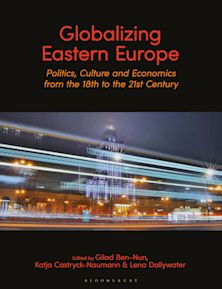- Home
- ACADEMIC
- Politics & International Relations
- European Politics
- European Governance and Democracy
European Governance and Democracy
Power and Protest in the EU
- Textbook
European Governance and Democracy
Power and Protest in the EU
- Textbook
Exam copy added to basket
Choose your preferred format. Please note ebook exam copies are fulfilled by VitalSource™.
Buy from Bloomsbury eTextBooks
You are now leaving the Bloomsbury Publishing website. Your eBook purchase will be with our partner https://www.vitalsource.com.
Your credit card statement will show this purchase originating from VitalSource Technologies. They will also provide any technical assistance you might require.
You must sign in to add this item to your wishlist. Please sign in or create an account
Description
Considering the future of European integration, this clear and compelling study explores the interplay between collective action and democracy in the European Union and its member states. Richard Balme and Didier Chabanet analyze the influence of supranational governance on democratization through a wealth of case studies on a broad range of civil society interests, including regional policy, unemployment and poverty, women's rights, migration policy, and environmental protection.
The authors trace the evolving relationship between citizens and European institutions over the past decades, especially as public support for deepening and widening integration has waned. This trend culminated in a deep institutional crisis precipitated by the rejection of the draft constitutional treaty in France and the Netherlands in 2005. At least two truisms were proven wrong during this tumultuous period: that European citizens have little interest in European integration and that citizens have little influence on EU politics. However, this power shift has left citizens with a deep distrust of integration and EU institutions with limited capacities to cope with issues the public considers priorities-primarily unemployment and social inequalities.
The book shows how Europe-wide interest groups formed and protesters were able to mobilize around key issues of integration. The authors convincingly argue that the growth of contentious social movements has also been nourished by the EU policy process itself, which leaves more room for interest groups and protest politics than for political parties and representative democracy. An essential primer on European democracy, this study will be invaluable for scholars and students in European politics and public policy, globalization and democracy, and comparative social movements.
Table of Contents
Chapter 1: Approaching Collective Action
Chapter 2: Collective Action and Civil Society in Europe
Chapter 3: The Making of a Polity: Interests' Mobilization around European Institutions
Chapter 4: European Integration and Varieties of Capitalism: The Brussels Consensus
Chapter 5: The European Burden: Unemployment and Political Behavior
Chapter 6: Beyond State Building: Centers and Peripheries in the European Union
Chapter 7: Collective Action and New Rights
Chapter 8: Interests' Mobilization in the Constitutionalization of Europe
Chapter 9: The Regulation of Interest Groups in the European Union
Conclusion: European Democracy and Social Justice
Bibliography
Product details
| Published | May 13 2008 |
|---|---|
| Format | Ebook (PDF) |
| Edition | 1st |
| Extent | 286 |
| ISBN | 9798216206330 |
| Imprint | Rowman & Littlefield Publishers |
| Series | Governance in Europe Series |
| Publisher | Bloomsbury Publishing |
About the contributors
Reviews
-
This is a very timely book that examines governance and democracy in the European Union. . . . This study is valuable for students and observers of EU politics, as well as for those interested in social justice, democratization, and the civil society movements. Recommended.
Choice Reviews
-
This is a book well worth reading both for its contributions to EU studies and research on contentious activity. It raises important questions of political action in systems of complex governance. . . . European Governance and Democracy represents the fusion of two distinct research areas: the politics of the European Union (EU) and how social movements/interest groups attempt to influence the political process. This fusion offers new opportunities to study processes of political mobilization in a multilevel, complex system of governance. It also illustrates the challenges of studying mobilization processes in such an environment. The book is well-rooted in both literatures.
Mobilization
-
This book, by two leading French scholars of collective political action, offers a bold and comprehensive study of interest group and protest politics at the European level. The combination of a cross-national structural analysis with a longitudinal comparison of a selected set of policymaking processes allows the authors to uncover the fundamental dynamics of European decision making. They show the complex multilevel mix of these processes, their sectoral compartmentalization, and, most importantly, their politicization. If European decision making now reaches beyond the arcane bureaucracies to which it was originally confined, the analysis, however, also points out that it keeps favoring those groups who already have a long-established record of influence at the national level.
Hanspeter Kriesi, European University Institute
-
European institutions and traditional forms of democratic participation have attracted a lot of scholars' attention, while collective action and social movements directed against the EU, with a few exceptions, have suffered from benign neglect. This book sheds new light on the European dream (for some) or nightmare (for others). The disconnection of EU regulatory powers from distributive or redistributive policies is a powerful trigger for political mobilization. This division of tasks has been a comfortable buffer for the Brussels elite for some time. In the long run it could become 'the kiss of death.'
Yves Mény, European University Institute
-
A gem. The book crisply sets out the relationship between European governance structures and collective political action and explores the implications of this relationship for the future of democracy in Europe. I don't know of any other work that takes on these important questions so comprehensively or successfully. It will quickly become a well-thumbed reference to European democracy.
Doug Imig, University of Memphis



































